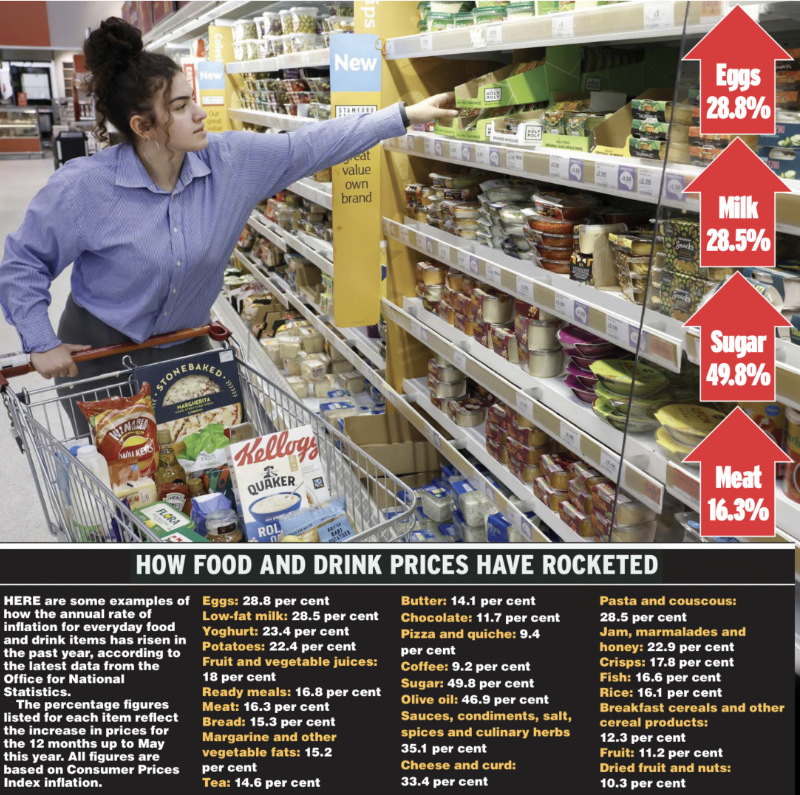
“The simple things that lead to success are all easy to do. But they’re also just as easy not to do.”
JIM ROHN
Another financial year ends
Good morning. We are almost at the end of another financial year. In the newsletter I wrote at this time last year, I was bemoaning the fact that the previous 12 months had been horrendous. However, I did point out that markets tend to have four bad years every decade and six good years, and my advice was to hang in there. That’s what I have been doing for as long as I can remember. Anyway, the market has done the right thing and the All Ordinaries Accumulation Index is up 13% from this time last year. It just proves the value of staying in there.
This is not to play down the state of the world right now. It seems that all the excesses and mistakes in the last few years are catching up. The trouble started when the GFC hit in 2008 and central banks around the world slashed rates to ridiculous levels. This was exacerbated when Covid hit and central banks poured petrol on the fire by printing trillions of dollars of money. Now it’s all caught up.
 Photo by JC Gellidon on Unsplash
Photo by JC Gellidon on Unsplash
Australia is now between a rock and a hard place. Inflation is rampant but much of it cannot be fixed by driving up interest rates. Much of it is due to supply and labour issues. But to make it worse, the Labor government is pouring billions of dollars into increased wages and so-called schemes to fix the housing shortage. The problem is the resources are not available to build the houses that Labor wants to build. While it’s great to see workers getting wage increases to help them cope with inflation, it ends up in a vicious circle. The increases in wages given because of inflation are themselves inflationary. So, we have the Labor government with their foot on the accelerator and the Reserve Bank trying to put their foot on the brake. It’s going to end badly.

Photo of Labour government and Reserve Bank solving inflation and housing crisis – by Meritt Thomas on Unsplash
According to Domain, Australia is facing a significant challenge in meeting its housing demand. The country is projected to receive 1,235,000 net overseas migrants over the next four years, requiring an additional 497,984 homes by 2025-26. This translates to a staggering need for 341 new homes every day over the four-year period.
However, the likelihood of Australia being able to fulfil these housing supply requirements is extremely low. Construction rates are declining, compounded by widespread builder failures and the substantial increase in materials and financing costs. During a recent Senate Estimates hearing, Treasury Secretary Steven Kennedy stated that the downward trend in dwelling approvals is expected to persist until 2025. Furthermore, investment in new dwellings is projected to decline by 2.5% this year, followed by a further decline of 3.5% in 2023-24 and an additional 1.5% in 2024-25.
Interest Rates
All eyes will be on the Reserve Bank on Tuesday 4 July when they announce the next interest-rate decision. It’s anybody’s guess, but around the world the trend is going up. Just this week the Bank of England (BoE) increased rates by 0.5%. It was the first major central bank to start hiking the rates to fight inflation and its efforts have been fruitless. British inflation is the worst among developed economies at nearly 9%. Consequently, the BoE may well be the last to finish hiking. The bank is expected to hike five more times by 0.25% to reach a peak rate above 6% by the end of this year or the beginning of the next.
Look at the latest UK inflation numbers – they are frightening. How would you cope if that happened here!?

Federal Reserve (Fed) Chair Powell recently said that the Fed will continue hiking rates, but because they are getting closer to the destination, it’s normal to slow down the pace. He repeated that two more hikes are a good guess and that the economy will suffer a period of tight credit conditions, below-average growth and higher unemployment to return to lower inflation.
Elsewhere, the Swiss National Bank (SNB) raised by 25bp as expected, Norges Bank of Norway surprised with a 50bp hike and announced there will be another rate hike in August – Turkey hiked from 8.5% to 15%.
Last week our Reserve Bank Deputy Governor, Michelle Bullock, argued that the unemployment rate would have to climb to 4.5% to tame inflation. For this scenario to happen 140,000 people may well lose their jobs. She was adamant that inflation will not return to the bank’s 2% to 3% target band without a sustained period of low employment growth. She said, “our assessment is that, for the first time in decades, firms’ demand for labour exceeds the amount of labour that people are willing and able to supply. That is, employment is above what we would consider to be consistent with our inflation target.”
Her statement was criticised as “entirely unnecessary” by Bill Kelty, the former ACTU secretary, who sat on the board of the RBA from 1987 to 1996. Kelty argued that inflation could be contained with an employment rate as low as 2.5%. Some union leaders called her speech “shameful” and asserted that it attacked a “busted system that was putting tens of thousands of lives at risk.”
Event in Brisbane alongside my son James
My choice of career has afforded me opportunities to speak to audiences all over the world about how to better manage their money. However, next month I’ve got something special in store for those in southeast Queensland.

On Friday 14 July, I’ll be speaking at an event in Brisbane alongside my son James. As you may know, James has been living in the US for the last 10 years and has built up an impressive audience, now reaching more than two million people each month through his podcast and social media channels.
Here are the details…
Date: Friday 14 July 2023
Time: 12 pm – 2 pm
Venue: The Warehouse, Fortitude Valley, Brisbane QLD
I’ll be talking about strategies for financial success in the uncertain times we’re in. James will be talking about how to Win the Day, which is a particularly timely message if you have children or grandchildren who could benefit from a positive and strong mindset.
We’ll also be doing a live Q&A and I’ll be gifting a copy of one of my books to every person who attends.
If you’re able to join us, we’d love to see you. Here is the link to register or for more information:
https://events.humanitix.com/the-springboard-and-co-presents-wintheday-with-james-whittaker
Tickets will sell out, so get in quickly if you’re interested.
The war on landlords
The rental crisis is not helped by the attack on landlords. Most states have passed onerous laws requiring landlords to comply with any “reasonable” request from a tenant and the Greens are calling for a national rental freeze, which would be a disaster. Analysis of new ATO data also shows that the net average annual number of people with rental property incomes has fallen a staggering 55% in five years across the nation.

Property Investors Council of Australia (PICA) Chair Ben Kingsley said it’s clear that the number of net individual investors isn’t keeping up with net rental demand, and the constant attacks and financial imposts on investors over the past five years in particular has pushed the country into a rental crisis, with Victoria the worst of the lot. Mr Kingsley said:
“Never in my lifetime would I have thought that a government of the day could be that dumb to consider rental freezes; yet, the Victorian Labor government is sounding a very clear message to mum and dad property investors – telling them your money is not required in Victoria, even though it has one of the lowest rental vacancy rates in the country.”

Property Investment Professionals of Australia Chair Nicola McDougall said investors had been selling up for years – which had resulted in a critical undersupply of rental properties nationwide – because for many it’s just not worth the financial risks nor the constant requirements to fund State Government coffers via higher taxes.
“PIPA has been warning for nearly a decade about the negative impacts of market intervention on rental markets, starting with the APRA lending restrictions that came into effect in 2015, and now a variety of rent caps or controls,” she said.
“The ATO stats don’t lie, investors have already deserted markets around the nation – and especially in Victoria and Queensland – because they no longer have control of their assets.
The negative annual result for investor numbers during the first year of the pandemic was the first time this had occurred since the GFC more than a decade before, but is set to happen again sooner rather than later as investors sell up in droves.”
Tax tricks
Tax is a big topic right now, as we rapidly approach 30 June. Be particularly careful when doing your tax returns, as the tax office have developed some of the most sophisticated data matching systems in the world. Their capabilities first came to my attention when I asked my accountant if I needed to let them know the interest I had received on my bank accounts – their reply was, “We don’t need that – the ATO has already told us.”
The accountant then alerted me to a problem that will affect a lot of people in the construction industry:
You may remember that, when Covid struck, part of the government stimulus was to give an instant write-off for items such as work vehicles. Think about Jack a tradie who took advantage of that and spent $110,000 on a new vehicle, trailer and equipment.

Of course, he didn’t have $110,000 sitting idly in the bank: the whole package was financed over a five-year term. The first problem is that Jack then had a liability of $110,000 on his balance sheet, but no corresponding asset to match. In some states that may preclude his ability to keep his building licence. But it gets worse – when Jack goes to trade the vehicle, the entire value of his trade-in will be taxable income, because the vehicle he trades will have a zero balance in his books. Furthermore, the debt may be more than the trade-in value. For many people, it’s a disaster waiting to happen.
And that’s just one example.
Let’s think about tax-deductible superannuation contributions:
Because you can claim a tax deduction for a concessional tax contribution up to $27,500 (which includes the employer’s contribution), it’s a strict requirement that you have to file a notice of intent with your superannuation fund before you lodge the tax return in which you claim that contribution as a tax deduction. I hear the tax office is very strict on this, and failure to lodge the notice on time can mean loss of the tax deduction.

Employers need to be aware that they must pay their compulsory employee superannuation contributions before 30 June if they wish to claim a tax deduction in the current year. If they pay the contribution after 30 June, they’ll have to wait till next year to claim the contribution. And note that to claim a tax deduction the contribution must be received by the employee’s fund by 30 June.
There is one strategy that may be useful for employers. If you intend to pay a staff bonus, you can record it in your books before 30 June as a liability to be paid in the next financial year. The bonus needs to be properly authorised by passing a resolution before year’s end. This will give the employer the tax deduction in the current year but the bonus won’t be taxable in the employee’s hands until next financial year. If determined and authorised after 30 June, it is not deductible for the employer until next year. Obviously, employers need to do some forward planning to make sure they reach an optimum situation.
These are just a few examples of why good advice is essential when tax time comes. The ATO has already announced a special focus on expenses for rental property – you can bet that they will know far more about your affairs than you think they do.
Moving into a retirement village
If you have ever investigated moving into a retirement village, you will know how hard it can be to crunch the numbers and understand the financial implications.
 Image by karlyukav on Freepik
Image by karlyukav on Freepik
There are fees that you need to pay to the village when you move in, while you live there and when you leave. The exit fees in particular can be complicated formulas that involve paying a percentage of your original purchase price or future sale price, sharing capital gain or loss, renovation costs, sales commissions and guaranteed buybacks (if your unit doesn’t sell within a certain amount of time).
The complexity is multiplied if you are trying to compare different payment options, different properties or one village with another. And you also need to work out what each option means for your age pension, whether or not you will qualify for rent assistance, how much money you will have left over to spend or invest, and what it can mean for your contribution to a home care package.
My good friend and co-author Rachel Lane has created a software program designed to take the financial confusion out of downsizing to a village, and it’s proving to be a big hit with operators and seniors alike.
 Image by pressfoto on Freepik
Image by pressfoto on Freepik
“My motivation was actually very simple,” she says. “Almost every person that I spoke to who had downsized to a retirement village (including my own grandma) said the same thing: ’My only regret is not moving sooner.’ I wanted to remove the financial confusion from that decision.
“Confusion about village fees, age pension entitlements, rent assistance and home care package costs leads to inaction,” she says. “And the delay isn’t just weeks or months; for many, it is years. Those are years they could have spent enjoying the lifestyle that retirement villages offer: feeling safe, being part of a community, engaging in hobbies and sports … in the words of a millennial, ‘living their best life’.”
Rachel understands the complexities of the financial arrangements and knows how impossible it all seems to people who don’t do it every day. “Unfortunately, many people who are thinking about downsizing into a village simply can’t work out what it all means for them, financially speaking. In theory, people can work out the village costs from the disclosure document, use an age pension calculator like the one on the Services Australia website, and then go to the My Aged Care home care costs estimator. But in reality, it’s virtually impossible, even for those comfortable with numbers. And the difficulty multiplies if they are comparing different homes, different contracts or one village with another.”
So what does Village Guru do?
In a nutshell, Village Guru gives you a personalised report showing the ingoing, ongoing and outgoing costs of moving to their village, plus an estimate of your age pension and rent assistance entitlements and home care package fees. It can compare different payment options (if the village offers them), different units in the village, or one village with another.
So if you are considering moving into a retirement village, ask for a Village Guru report; it’s free and it makes sure you understand the numbers before you sign on the dotted line.
There are already hundreds of villages using the software, from big providers like Ingenia, Aveo, Australian Unity, Bolton Clarke and Anglicare to more boutique options like Living Choice and Sencia.
And if a move has just seemed too hard, ask for a Village Guru report from the village you are considering moving to. It will make the move a whole lot easier.
See https://www.villageguru.com.au for more.
Latitude credit card
For a long time, I wrote good things about the 28° MasterCard because it has no annual fees and charges no commissions on overseas transactions. It’s now become the Latitude MasterCard and their service levels have dropped dramatically. I much prefer the ING debit card for overseas transactions as there are no fees and they refund the hidden commissions – nobody else does this. This month Geraldine went to visit James in Los Angeles and used her ING card exclusively. She was refunded $210 of hidden commissions by ING. In contrast, I used my Amex card recently for an American plane ticket and they charged a 4% flat commission fee.

I do keep a Latitude card as a backup. Recently I got a phone call from them with a recorded message telling me that they thought my Latitude card had been compromised and to press 1 if the transaction was genuine and 2 if not. The transaction question was for a “taxi for $24”. As I have not used a taxi for at least a month I pressed the 2 button. After waiting on for 35 minutes the person at the other end of the phone said it was meant to be an Uber transaction which was a genuine one. I confirmed it was genuine and thought that would be the end of it. My Apple wallet now tells me the card is suspended. This meant another phone call to Latitude, which this time I gave up on after waiting for 50 minutes. I then used their online communication mechanism and was told I would have an answer within 30 days. Imagine if you’re overseas and that was the only card you had. It’s pathetic.
And finally
Musical puns

I wanted to learn to play the organ, but it was only a pipe dream.
The piano in the aquarium needed attention, so they called in the piano tuna.
My teacher asked me why I was playing the piano with my head. I said I’m playing by ear.
The squeeze box is the best instrument there is, accordion to the experts.
The person who invented the electric guitar must have been a livewire.
Some violinists are so highly strung they should bow out.
My music teacher was going to replace me from the band. I asked, Is that a fret?
I dated a violinist but said no strings attached.
I started learning the violin but found it too fiddly.
My guitar band had a gig on a TV show, but then it got axed.
I wanted to sign up for a sitar course but there were too many strings attached.
Marvellous experience playing the bagpipes — breathtaking!
Considering the bagpipes? Think a glen!
Why do people keep bagging out that Scottish instrument?
A clarinet tried to join a string quartet but the others thought it was just a blow in.
My clarinet has a good pitch. I can hit someone in the audience at 20 metres.
All the brass players I know seem really nice, except for one guy who can blow his own trumpet.
My dad was a tuba player. Couldn’t take him anywhere. Such a blowhard.
 I hope you have enjoyed the latest edition of Noel News.
I hope you have enjoyed the latest edition of Noel News.
Thanks for all your kind comments. Please continue to send feedback through; it’s always appreciated and helps us to improve the newsletter.
And don’t forget you’ll get more regular communications from me if you follow me on twitter – @NoelWhittaker.
Noel Whittaker
